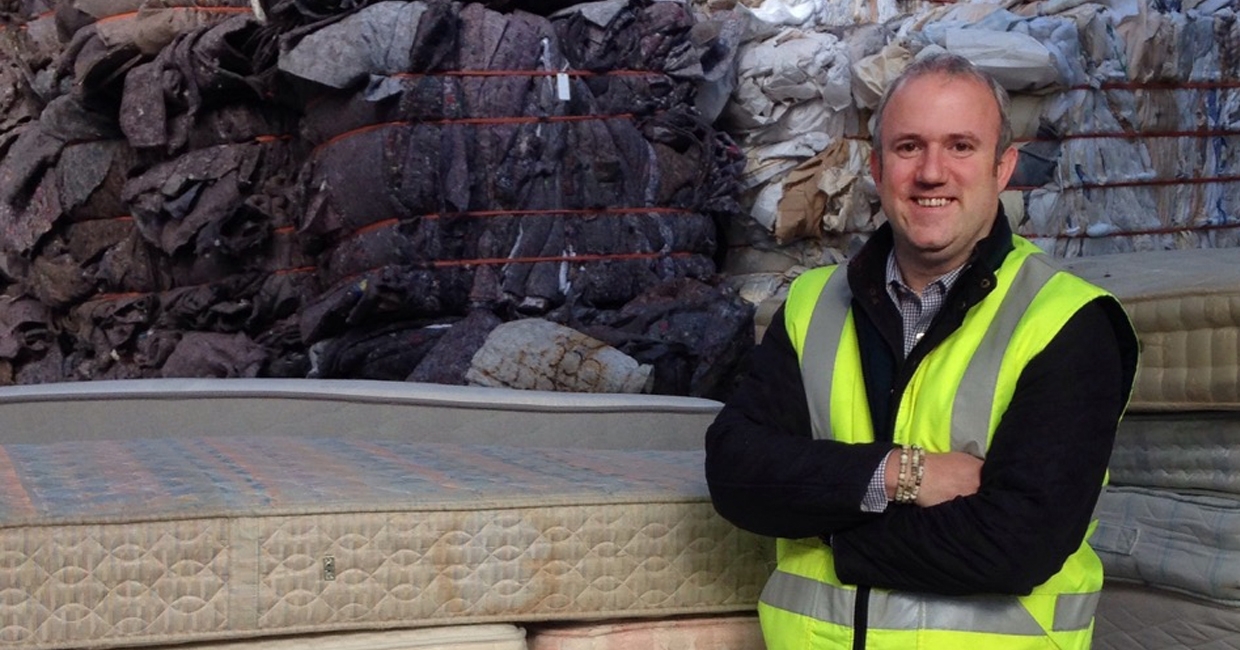A circular economist and an authority on recycling and sustainability, Nick Oettinger is the founder and CEO of mattress recycling, rejuvenation and collection firm, The Furniture Recycling (TFR) Group, which works with local authorities, home delivery companies, waste management sites and retailers (including John Lewis, IKEA, Bensons, Argos, M&S and Arighi Bianchi) to divert this difficult waste stream from landfill …
How did you enter the trade?
I first started out in business cleaning swimming pools. I moved up within the company to finally lead a management buyout of the UK’s largest swimming pool construction company.
After selling my shares in the business, I then made a move into the recycling industry working as an improvement consultant. There was a poignant moment at a landfill site when a mattress became wrapped around the driveshaft of a delivery vehicle on site, which got me thinking about how each component of a mattress could be broken down to ensure that as much of it was recycled and 100% diverted from landfill.
Who was your inspiration?
My first-ever boss. He taught me most of what I know in business today. However, my family continues to inspire daily, and as the business has grown, I’m blessed to be able to say that our dedicated team inspires me too.
What was your career high point?
Being recognised as a global recycling hero by the Global Recycling Foundation. The celebration of our work was truly rewarding and a great reflection of our colleagues’ fantastic efforts over the years.
… and low point?
Having to close our doors across all sites as a result of Covid lockdowns and Government restrictions. It was extremely difficult to send all of our colleagues home for what would be a very uncertain period.
Thankfully, we were able to safely reopen our facilities’ doors again shortly after.
… and the turning point?
Moving to larger premises – our current headquarters in Blackburn – in order to facilitate the growth of our research and development, as well as our engineering department.
The mattress recycling process is very time consuming and labour intensive when you do it manually, so automation is key. I’m very pleased to say that we now have a world-first automated pocket spring recycling machine, a world-first automated mattress stripping machine, as well as a prototyped revolutionary system that allows a standard 40ft trailer, that ordinarily carries 90 mattresses, to carry 600 of them.
Describe a typical working day …
A typical working day is mostly spent looking after our clients and meeting with them to offer strategic advice and support for their own sustainable initiatives, as well as setting out the wider business strategy for TFR Group.
I will also check in with our R&D team daily to see how things are progressing with improving efficiencies and processes so we can grow sustainably.
Business tends to get particularly busy from November to January with the Black Friday, Boxing Day and January sales, so you’ll sometimes find me in the warehouse stripping mattresses, much to the amusement of the team!
I tend to leave the office and spend my evenings catching up with my family whilst enjoying a glass of wine.
If you had to start over, what career might you pursue?
My mother has always said I should have been a doctor or a medical professional, so something down that route!
What date on the business calendar do you most look forward to?
The January sales are our busiest time, so it not only provides us a great challenge to overcome, but also means we can kickstart the new year as we mean to go on, having enjoyed some relaxation time over the Christmas period.
What is the most important issue affecting your business right now?
There are a number of challenges, but one is educating the industry about the recycling and rejuvenation services that are available, showing them there’s an alternative to landfill, and encouraging the manufacturing industry to consider products’ end-of-life (EOL) during the design stage.
In order to create a truly circular economy, we all need to work together to make real changes to the way that we design, manufacture, promote, sell and manage EOL products, packaging and goods.
Which company do you look up to?
I couldn’t name just one, but I look up to any business who has set sustainability goals and has put measures in place towards creating a truly circular economy.
What would you most like to change about yourself?
To be able to switch off from work of an evening to enjoy some more well-deserved family time with my wife and children.
What do you enjoy most about working in the trade?
I enjoy pioneering innovative new solutions to problems no-one else has even identified, let alone tried to tackle. I’m also very proud of the work we as a business have done to keep mattresses out of landfill. Every now and again, I get a little buzz out of what we’ve been able to do – usually when I add it all up. We recently passed the three million mattress mark, and if you convert that into space, it’s a huge amount! Knowing that our work is having a real impact on the world is one the most rewarding parts of my business.
It’s also great to see the progression of our colleagues, through regular training opportunities and leading industry support - we’re proud to say we work closely with those who don’t receive enough opportunities in the workplace, including the long-term unemployed and those with previous convictions who don’t always get the opportunities that they deserve.
Can you leave us with a word of advice?
The circular economy is completely misunderstood by many organisations. Whilst the ‘circular’ element is a prominent thought, many businesses forget the ‘economy’ component. The true value of the circular economy is building in the value of the products – utilising renewable products that can create commodity value further down the line.
This interview was published in the February 2022 issue of Furniture News, as part of a special feature exploring Eco Conscious approaches.







